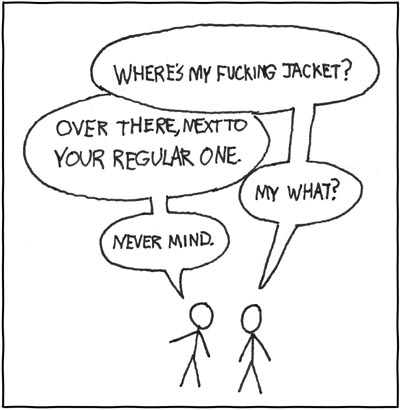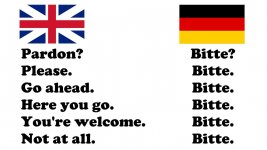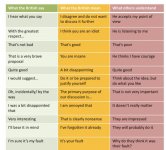You are using an out of date browser. It may not display this or other websites correctly.
You should upgrade or use an alternative browser.
You should upgrade or use an alternative browser.
Since the 90s I hold the theory that every word has a "emonational picture", as i call it, a "Gefühlsbild", that's my German-language expression for it.
One could also call it an "emotional impression".
It's basically the feelings that a word is connected with, and these feelings/emotions are a distinct set of information. Feelings/emotions as a carrier of information.
And I tend to believe that feelings/emotions are the primal container of information, far before "language" in our human sense was developed - and far before we humans developed a lexical information storage container, so to say.
So, this means that each word has 2 "meanings" in the sense of "being a container for information". The one is the "lexical meaning", the other one is the "motional picture".
My theory goes like this : Any time we learn a word for the very first time, we take into account the
- sound of it
- the facial expression of the person using it at the same time as the word is spoken
- the gesture of the person using it at the same time as the word is spoken.
An easy example : If I tell a child "a snake is dangerous !", then the child gets all of this information, even BEFORE it is shown a snake as a picture or as a living being !
Sometimes, of course, the child might see an actual snake and - for example - the mother stands beside it, pointing at the snake, and saying "Snakes are dangerous !"
The sound of it (here represented by the exclamation sign) and the facial expression of the mother give the child a set of information that is - in my theory - apart from the lexical-logical set of information.
This goes so far that even if I was sitting amongst a jungle tribe, and someone of these persons would tell me something, but i don't know the words -
- then i wouls *still* be able to draw at least *some information from the spoken words !
The sound of the word, the facial expression and the gesture.
Judging from all of this, the word the person just used carries the information "danger".
This could be important for actual learning/i] words - not by the book, but by using this "emotional picture".
--- INTERLUDE BEGIN ---
This can lead to a misinterpretation.
In my case - and this is solely my personal experience ! - there was/is an English word with which i had these problems.
the word begis with a rough "thr" sound. That makes the word sound "dangerous" to me. In fact, all words having lots of consonents and lots of "r" sounds soun to me unpleasant - and often dangerous. Like the linked theory about the "r" sound suggests.
https://www.nature.com/articles/s41598-021-04311-7
That word, that transports a sense of danger - and of aggression, as well, is liked to a person that stands for danger and aggression.
And that person was an Orc.
There I came into famous first contact
( that phrase is known from of so many sci-fi movies & novels these days that it has almost become a meme or proverb )
with that word, and it was the name - and, as I then thought, thus describing - and Orc.
An Orc having this name, and,as I thought, Orcs usually have names that radiate danger, aggression, and sometimes strength. Because developers wanted Orcs to be all of that.
And the name of that Orc - whom I believed to be a dangerous and aggressive member of his race - was -
- Thrall.
Since that first contact, the word "thrall" means "danger" to me. Because i have actually looked up its meaning - for decades believing tha it was only a nonsense word like so many fantasy names indeed are - in a dictionary only last year.
Apparingly I have stored it in my "emotional information storage/container" as that. As a word combined with emotions of "danger" and of "aggression".
And that Orc was from an article about the cancelled Blizzard adbventure game.
A recent article about it : https://www.gameinformer.com/2019/0...-adventure-game-shaped-the-future-of-warcraft
Only last year I had my SECOND contact with that year.
It was within an adventure of "Dungeons & Dragons online", in which it was suddenly witten/said that a pretty normal person visiting a manor "could become an evil Baron's thrall" (and it was hinted at that this evil Baron could be in fact a Vampire).
So, this was my very SECOND contact of that word.
The following happened :
1. I realized that "Thrall" was not a name (or not a simple one)
2 it was used in an entirely different context : A non-aggressive, non-dangerous person could become a "thrall", whatever this meant !
3. It must therefore mean something entirely different than what i had always stored in mymemory.
And at that point, I looked it up.
In a dictionary.
and, the surprising thing is : No matter how much I've tried since then, the stored information of "danger, aggression" combined with the word "threall" can not be erased or overwritten. I know. Ive tried it.
So, this "emotional picture" that was created by that sheer sound of the "thr" combination must have been fairly strong.
And the above linked article from Nature supports it : https://www.nature.com/articles/s41598-021-04311-7
---INTERLUDE END---
Further reading : The "Kiki/Bouba - Problem" : https://en.wikipedia.org/wiki/Bouba/kiki_effect
It is about that there are other letters which can transport non-lexical ( I'd say : emotional ) information.
Though, in recent time there has been a study suggestion rather that the "b" and the "k" letters are the ones transporting that kind of information.
This all creates rather more question than resolves anything.
- Do the cases of Alzheimer patiens who can recognize music - and sometimes even sing to it - mean that these patience stil, have access to the "emotional information storage/containers" even after having lost [access to] all lexical information storage/containers ?
- Is racism based on the sound of peoples languages, too ?
- Do we humans have a bias towards people with other languages based on how our own languages are constructed ?
- Do languages with more consonants than vowels - with more "r" sounds, especially - sound more "dangerous" and more "aggressive" to those whose languages have more vowels ?
- Do we for example have a bias against peoples whose languages have lots of consonants, and especially of "r" sounds, like the ones in that Nature article ? https://www.nature.com/articles/s41598-021-04311-7
- And I ask myself : Why do European slavic languantges and Arabian-based languages sound more unpleasant to me ?
Why do these languages often sound more "dangerous" and more "aggressive" to me, even although I do know that the peoples behind that are not so ?
Am I a racist because of that ?
- What about Patriach based cultures in which strength and aggression is believed to be something positive for men ?
- Do culture systems like that rather evolve into having more sounds that sound more "rough", more dangerous or more aggressive ?
- What about the opposite of that ? Does this mean that languages which contain LOTS of vowels means that they are trying to be more peaceful ?
- Are languages with more vowels more Matriarch based ?
- Japan comes in mind, but that is didfficult for me, because I really do not know enough of the Japanese culture. I have read in newspapers, however, that their Court is a very restzrictive one. More Patriarch based, I guess, which would be a counter- example to my questions from above : A language with LOTS of vowels, but very strict and Patriarch based ?
More questions and more questions . . .
And the people at Blizzard just didn't know what they did to me . . .
One could also call it an "emotional impression".
It's basically the feelings that a word is connected with, and these feelings/emotions are a distinct set of information. Feelings/emotions as a carrier of information.
And I tend to believe that feelings/emotions are the primal container of information, far before "language" in our human sense was developed - and far before we humans developed a lexical information storage container, so to say.
So, this means that each word has 2 "meanings" in the sense of "being a container for information". The one is the "lexical meaning", the other one is the "motional picture".
My theory goes like this : Any time we learn a word for the very first time, we take into account the
- sound of it
- the facial expression of the person using it at the same time as the word is spoken
- the gesture of the person using it at the same time as the word is spoken.
An easy example : If I tell a child "a snake is dangerous !", then the child gets all of this information, even BEFORE it is shown a snake as a picture or as a living being !
Sometimes, of course, the child might see an actual snake and - for example - the mother stands beside it, pointing at the snake, and saying "Snakes are dangerous !"
The sound of it (here represented by the exclamation sign) and the facial expression of the mother give the child a set of information that is - in my theory - apart from the lexical-logical set of information.
This goes so far that even if I was sitting amongst a jungle tribe, and someone of these persons would tell me something, but i don't know the words -
- then i wouls *still* be able to draw at least *some information from the spoken words !
The sound of the word, the facial expression and the gesture.
Judging from all of this, the word the person just used carries the information "danger".
This could be important for actual learning/i] words - not by the book, but by using this "emotional picture".
--- INTERLUDE BEGIN ---
This can lead to a misinterpretation.
In my case - and this is solely my personal experience ! - there was/is an English word with which i had these problems.
the word begis with a rough "thr" sound. That makes the word sound "dangerous" to me. In fact, all words having lots of consonents and lots of "r" sounds soun to me unpleasant - and often dangerous. Like the linked theory about the "r" sound suggests.
https://www.nature.com/articles/s41598-021-04311-7
That word, that transports a sense of danger - and of aggression, as well, is liked to a person that stands for danger and aggression.
And that person was an Orc.
There I came into famous first contact
( that phrase is known from of so many sci-fi movies & novels these days that it has almost become a meme or proverb )
with that word, and it was the name - and, as I then thought, thus describing - and Orc.
An Orc having this name, and,as I thought, Orcs usually have names that radiate danger, aggression, and sometimes strength. Because developers wanted Orcs to be all of that.
And the name of that Orc - whom I believed to be a dangerous and aggressive member of his race - was -
- Thrall.
Since that first contact, the word "thrall" means "danger" to me. Because i have actually looked up its meaning - for decades believing tha it was only a nonsense word like so many fantasy names indeed are - in a dictionary only last year.
Apparingly I have stored it in my "emotional information storage/container" as that. As a word combined with emotions of "danger" and of "aggression".
And that Orc was from an article about the cancelled Blizzard adbventure game.
A recent article about it : https://www.gameinformer.com/2019/0...-adventure-game-shaped-the-future-of-warcraft
Only last year I had my SECOND contact with that year.
It was within an adventure of "Dungeons & Dragons online", in which it was suddenly witten/said that a pretty normal person visiting a manor "could become an evil Baron's thrall" (and it was hinted at that this evil Baron could be in fact a Vampire).
So, this was my very SECOND contact of that word.
The following happened :
1. I realized that "Thrall" was not a name (or not a simple one)
2 it was used in an entirely different context : A non-aggressive, non-dangerous person could become a "thrall", whatever this meant !
3. It must therefore mean something entirely different than what i had always stored in mymemory.
And at that point, I looked it up.
In a dictionary.
and, the surprising thing is : No matter how much I've tried since then, the stored information of "danger, aggression" combined with the word "threall" can not be erased or overwritten. I know. Ive tried it.
So, this "emotional picture" that was created by that sheer sound of the "thr" combination must have been fairly strong.
And the above linked article from Nature supports it : https://www.nature.com/articles/s41598-021-04311-7
---INTERLUDE END---
Further reading : The "Kiki/Bouba - Problem" : https://en.wikipedia.org/wiki/Bouba/kiki_effect
It is about that there are other letters which can transport non-lexical ( I'd say : emotional ) information.
Though, in recent time there has been a study suggestion rather that the "b" and the "k" letters are the ones transporting that kind of information.
This all creates rather more question than resolves anything.
- Do the cases of Alzheimer patiens who can recognize music - and sometimes even sing to it - mean that these patience stil, have access to the "emotional information storage/containers" even after having lost [access to] all lexical information storage/containers ?
- Is racism based on the sound of peoples languages, too ?
- Do we humans have a bias towards people with other languages based on how our own languages are constructed ?
- Do languages with more consonants than vowels - with more "r" sounds, especially - sound more "dangerous" and more "aggressive" to those whose languages have more vowels ?
- Do we for example have a bias against peoples whose languages have lots of consonants, and especially of "r" sounds, like the ones in that Nature article ? https://www.nature.com/articles/s41598-021-04311-7
- And I ask myself : Why do European slavic languantges and Arabian-based languages sound more unpleasant to me ?
Why do these languages often sound more "dangerous" and more "aggressive" to me, even although I do know that the peoples behind that are not so ?
Am I a racist because of that ?
- What about Patriach based cultures in which strength and aggression is believed to be something positive for men ?
- Do culture systems like that rather evolve into having more sounds that sound more "rough", more dangerous or more aggressive ?
- What about the opposite of that ? Does this mean that languages which contain LOTS of vowels means that they are trying to be more peaceful ?
- Are languages with more vowels more Matriarch based ?
- Japan comes in mind, but that is didfficult for me, because I really do not know enough of the Japanese culture. I have read in newspapers, however, that their Court is a very restzrictive one. More Patriarch based, I guess, which would be a counter- example to my questions from above : A language with LOTS of vowels, but very strict and Patriarch based ?
More questions and more questions . . .
And the people at Blizzard just didn't know what they did to me . . .
NSFW?


My closet in a nutshell I'm afraid to say it's full of coats.
Got a few pairs for every season.
Short vs. Regular vs. Long Fit you Pick one.:lol:
Got a few pairs for every season.
Short vs. Regular vs. Long Fit you Pick one.:lol:
I suppose we all have our preference regarding the material for a f. jacket (leather, chainmail, semi-transparent, who knows what else).
It's a fine distinction, as one wouldn't wear the same jacket say, at a wedding, a funeral or a job interview (in general).
It's a fine distinction, as one wouldn't wear the same jacket say, at a wedding, a funeral or a job interview (in general).
I think everybody here knows what a "Lich" is. That one is common in Fantasy settings.
However, I never quite understood where this word might come from.
Recently, I noticed that in the song by the British band Marillion (its early name was Silmarillion) called Garden Party (it's about social sheningans on a party), there's that line :
"Social leeches quoting chaucer".
The word "leeches" is pronounced ina way that sounds for me like "Liches".
I wonder, therefore, whether the word "Lich" comes from that ?
However, I never quite understood where this word might come from.
Recently, I noticed that in the song by the British band Marillion (its early name was Silmarillion) called Garden Party (it's about social sheningans on a party), there's that line :
"Social leeches quoting chaucer".
The word "leeches" is pronounced ina way that sounds for me like "Liches".
I wonder, therefore, whether the word "Lich" comes from that ?
@Alrik Fassbauer;
"Lich" is an old English word for corpse. It is the same word as the German word "Leiche" which means corpse as well.
"Lich" is an old English word for corpse. It is the same word as the German word "Leiche" which means corpse as well.
In DDO, I come across this formulation :
"The evil Sahuagin make sacrifices to The Devourer at this fell shrine."
Shouldn't it be "fallen" ? I don't understand this.
"The evil Sahuagin make sacrifices to The Devourer at this fell shrine."
Shouldn't it be "fallen" ? I don't understand this.
fragonard
Sentinel
Fell also means rocky hill or mountain in old English so it could mean mountain shrine or hill shrine. Possibly.
Hm, that sounds a bit like it ... Thank you.
E
Eye
Guest
E
Eye
Guest
E
Eye
Guest
In old English female versions of baker and brewer exists:
female baker = Baxter or Bakster
female brewer = Brewster
-ster was a female ending in old English.
***
In old German dialects you can do something similar:
If you add -sche to a surname than a female of the family is adressed:
Family Name: Müller
Male: der Müller
Female: die Müllersche (in Modern German: die Müllerin)
female baker = Baxter or Bakster
female brewer = Brewster
-ster was a female ending in old English.
***
In old German dialects you can do something similar:
If you add -sche to a surname than a female of the family is adressed:
Family Name: Müller
Male: der Müller
Female: die Müllersche (in Modern German: die Müllerin)
I didn't know that. That's quite interesting.
The "-in" suffix in current German language is essentially the same as the "she-" prefix in some English words like in "She-Hulk". A female Hulk would be in German language a "Hulkin", so to say.
There are more languages out there, in which words are defined as being female just. because of a suffix. I don't know of any prefixes, but I could imagine that, too.
Besides, the name of Tolkien isn't a female Tolk, as far as I know ...
Wikipedia has this about his name :
There are more languages out there, in which words are defined as being female just. because of a suffix. I don't know of any prefixes, but I could imagine that, too.
Besides, the name of Tolkien isn't a female Tolk, as far as I know ...
Wikipedia has this about his name :
According to Ryszard Derdziński the Tolkien name is of Low Prussian origin and probably means "son/descendant of Tolk", with Tolk meaning interpreter or negotiator and originating as a nickname.[1][2] A number of other theories on the meaning of the name have been proposed, including that it is derived from the village of Tolkynen in East Prussia.[3][4] J. R. R. Tolkien suggested the name was derived from the German adjective tollkühn, meaning foolhardy.[1][2] Several people with the surname Tolkien or similar spelling, some of them members of the same family as J. R. R. Tolkien, live in northern Germany, but most of them are descendants of recent refugees from East Prussia who fled the Red Army invasion (1945).[1][2] J. R. R. Tolkien's own knowledge of the family history was limited to its 18th-century German origin,[5] according to Derdziński in part because he was "early isolated from the family of his prematurely deceased father."[1][2]
According to Ryszard Derdziński, the Tolkien name is of Low Prussian origin and probably means "son/descendant of Tolk".[3][4] Tolkien mistakenly believed his surname derived from the German word tollkühn, meaning "foolhardy",[6] and jokingly inserted himself as a "cameo" into The Notion Club Papers under the literally translated name Rashbold.[7] However, Derdziński has demonstrated this to be a false etymology. While J. R. R. Tolkien was aware of his family's German origin, his knowledge of the family's history was limited because he was "early isolated from the family of his prematurely deceased father".[3][4]



